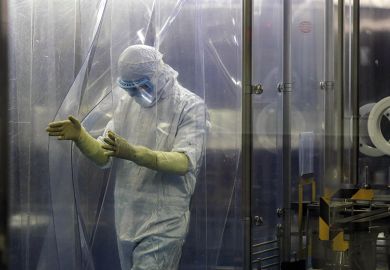Hong Kong academics have launched a major effort to track the spread of the Wuhan coronavirus, amid concern about efforts to control the infection in mainland China.
The University of Hong Kong study estimates that there have been more than 1,300 cases of the virus in Wuhan, and provides additional estimates for 20 other Chinese cities, implying a broader spread of the disease than official figures currently show.
The team from HKU’s World Health Organisation Collaborating Centre for Infectious Disease Epidemiology and Control also launched an online tool that uses modelling to help public authorities predict outbreaks.
Chinese officials said on 21 January that nearly 300 people had been infected with the virus, which causes a type of pneumonia. Six people have died from the infection, which can be passed from person to person.
Gabriel Leung, dean of HKU’s Li Ka Shing Faculty of Medicine, said that the university was publishing the predictions “because we want to be helpful to public health”. “If you were a local health municipality, these are the numbers you should be expecting,” said Professor Leung, one of the report’s co-authors.
HKU took a “similar approach” to researchers at Imperial College London, whose 17 January report estimated that 1,723 cases in Wuhan had onset symptoms by 12 January.
The HKU research drew on train, road and air travel data for the busy Lunar New Year holiday, or chunyun, which begins this week.
Hong Kong medical experts saw first-hand the ramifications of the Sars virus, whose deadly spread was blamed in part by a lack of timely information by the Chinese authorities in 2002 and 2003. At that time, Hong Kong was at the forefront of both fighting and publicising news of the disease.
“I was among the small group, globally in the public health arena, who experienced Sars and literally rolled up our sleeves in the public health and epidemiological effort,” said Professor Leung, a former under-secretary for food and health in the Hong Kong government. “There’s a very strong sense of déjà vu this time, except the timescale has been compressed.”
“This is why we have to keep ourselves and the whole community honest,” he said, adding that the medical school decided “not to go through the traditional scientist-reviewed journal publication processes. Perhaps we are doing ourselves, as academics, a disservice, as we are almost risking [not] publishing in a journal by publishing it online ourselves. We believe so strongly that it’s important to keep communication open, transparent, and to release information at the first possible moment.”
There are still concerns about whether the Chinese authorities are being fully transparent about the Wuhan virus, although Professor Leung said the situation was better than before.
“I have no doubt that the timescale of recognising and reporting information is a vast improvement over Sars. What took months in 2002 and 2003 is now happening in weeks, even days,” he said. “Is it as quick as possible? I don’t know. But it is a huge step forward.”
Yuen Kwok-yung, the HKU professor whose team first discovered the Sars coronavirus in 2003, recently returned from Wuhan, where he was an expert consultant to the Chinese authorities. He said that Hong Kong and the mainland had “significantly improved their preventative measures and disease control work in the past decade or so”.
Professor Leung warned that HKU’s estimates relied on the underlying assumption of proper screening and public alertness. If a “super spreading event” were allowed to happen, or if the disease developed multiple epicentres outside Wuhan, the situation would be “much more severe”, he said.
Register to continue
Why register?
- Registration is free and only takes a moment
- Once registered, you can read 3 articles a month
- Sign up for our newsletter
Subscribe
Or subscribe for unlimited access to:
- Unlimited access to news, views, insights & reviews
- Digital editions
- Digital access to THE’s university and college rankings analysis
Already registered or a current subscriber?








